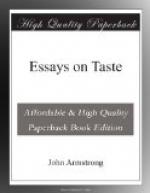The two reprints from the twenty letters of John Gilbert Cooper’s Letters concerning Taste. To which are added Essays on similar and other Subjects are from the third edition, dated 1757; the first edition was published in 1755 as Letters concerning Taste. The selections by John Armstrong are taken from the two-volume Miscellanies published in 1770. “The Taste of the Present Age” received its first publication in this edition, but the other prose had previously been published in 1758 under the pseudonym of Launcelot Temple in the first volume of Sketches: or Essays on Various Subjects. The poem Taste: An Epistle to a Young Critic was first published in 1753.
Ralph Cohen
LETTERS CONCERNING TASTE.
LETTER I.
To EUPHEMIUS.
Whence comes it, EUPHEMIUS, that you, who are feelingly alive to each fine Sensation that Beauty or Harmony gives the Soul, should so often assert, contrary to what you daily experience, that TASTE is governed by Caprice, and that BEAUTY is reducible to no Criterion? I am afraid your Generosity in this Instance is greater than your Sincerity, and that you are willing to compliment the circle of your Friends, in giving up by this Concession that envied Superiority you might claim over them, should it be acknowledged that those uncommon Emotions of Pleasure, which arise in your Breast upon the Observation of moral or natural Elegance, were caused by a more ready and intimate Perception of that universal TRUTH, which the all-perfect CREATOR of this harmonious System ordained to be the VENUS of every Object, whether in the Material World; in the imitative Arts; or in living Characters and Manners. How irreconcileable are your Doctrines to the Example you afford us! However, since you press me to justify your Practice against your Declarations, by giving a Definition of what is meant by TASTE, I shall not avoid the invidious Office of pointing out your superior Excellence to others, by proving that TRUTH and BEAUTY are coincident, and that the warmest Admirers of these CELESTIAL TWINS, have consequently Souls more nearly allied to ætherial Spirits of a higher Order. The effect of a good TASTE is that instantaneous Glow of Pleasure which thrills thro’ our whole Frame, and seizes upon the Applause of the Heart, before the intellectual Power, Reason, can descend from the Throne of the Mind to ratify it’s Approbation, either when we receive into the Soul beautiful Images thro’ the Organs of bodily Senses; or the Decorum of an amiable Character thro’ the Faculties of moral Perception; or when we recall, by the imitative Arts, both of them thro’ the intermediate Power of the Imagination. Nor is this delightful and immediate Sensation to be excited in an undistempered Soul, but by a Chain of Truths, dependent upon one another




